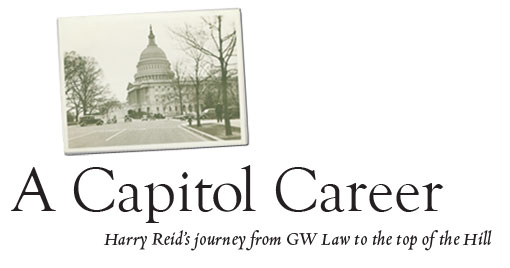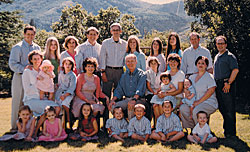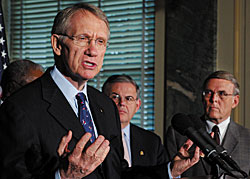|

By Jamie L. Freedman
As Election Day 2005
wound to a close this past November, Harry Reid (D-Nev.),
JD ’64, emerged as a double victor—winning his
fourth term as a U.S. senator and securing his party’s
unanimous support as the Senate’s new Democratic leader.
Since graduating from GW Law School in 1964, Reid has spent
nearly his entire career in public life.

Photo by Julie Woodford |
Widely regarded as one of Washington’s
most skilled legislators, the soft-spoken senator from Searchlight,
Nev., is quick to admit that he never set out to become a
national political leader. “I’d love to give you
some great philosophical reason about why I entered public
service, but the fact is that I had no political aspirations,”
Reid told GW Law School magazine this spring from
his second floor office in the U.S. Capitol. A hard-rock miner’s
son who was raised in a small cabin without indoor plumbing
and educated in a two-room elementary school in tiny Searchlight,
Reid moved with his wife, Landra, and young children to Washington
in 1961 to attend GW Law, working nights as a U.S. Capitol
police officer to support the growing family.
Law degree in hand, he returned to Nevada,
launching his political career as city attorney of Henderson,
where he’d attended high school. “There was an
opening in the city attorney’s office, and, although
I initially had no interest in it, my father-in-law convinced
me to apply,” he says. The young Reid rapidly made a
name for himself, revising the city charter and helping to
extend Henderson’s boundaries by acquiring federal land.
In 1966, he assumed his first elected position on the hospital
board of southern Nevada, and, in 1968, he won a seat on the
Nevada State Assembly, introducing the first air pollution
legislation in the state’s history. Two years later,
at the age of 30, Reid was elected Nevada’s youngest-ever
lieutenant governor. He went on to chair the Nevada Gaming
Commission for five years beginning in 1977, winning accolades
for his relentless quest to clean up the state’s gaming
industry.

Many of Sen. Harry Reid's happiest
moments are spent with his large, close-knit family,
composed of his wife and high school sweetheart, Landra,
their five children, Lana, Rory, Leif, Josh, and Key,
and 15 grandchildren ranging in age from 1 to 13. |
Reid won his first of two terms in the U.S.
House of Representatives in 1982, earning acclaim for introducing
the landmark Taxpayer Bill of Rights. In 1986, he was elected
to the U.S. Senate, where he has built a strong record of
accomplishment and served as chairman of many important committees
and subcommittees, including, most recently, the Environment
and Public Works committee and the Ethics committee. Reid
was chosen by his Senate colleagues to serve as the second-highest-ranking
Democrat in the Senate—known as the Whip—in 1998,
and in 2004, he was unanimously elected Senate Democratic
Leader after former Minority Leader Tom Daschle (D-S.D.) lost
his bid for re-election. “The work is more intense,”
he says of the new position, predominantly because he has
to “deal on a personal basis with many more senators”
than in the past. “That’s the job,” he states.
Throughout his 23 years on Capitol Hill,
Reid has enjoyed fighting for the rights and interests of
the people who sent him there. “I think that the thing
that has kept me invigorated is being able to make changes
in people’s lives,” he says. “I feel fortunate
to be able to serve in Congress and enjoy looking back on
the things that we’ve been able to change for the better,
as well as looking forward to things that we want to continue
to work on to change.”

Harry Reid discusses the Senate's
upcoming votes on judicial nominations during a news
conference on Capitol Hill May 24. In the background
are Rep. Robert Menendez (D.-N.J.) and Sen. Byron Dorgan
(D.-N.D.).
Photo by Dennis Cook, AP/WWP
|
Topping his agenda are health care for all
Americans, energy independence for the country, retirement
security, education, and stopping the privatization of Social
Security (see sidebar). “We have a lot of work to do
here, since the country is so complicated socially and economically,”
he says, noting that passing and implementing new legislation
is only half of the equation. “Some of our most important
legislative accomplishments are what we stop from passing.”
Despite the rigorous demands of his career,
Reid’s tight-knit family has remained his top priority
through the years. When asked what legacy he would most like
to leave the American people, the proud father of five and
grandfather of 15 quickly states, “Frankly, I’m
more interested in the legacy that I leave to my family, which
is to work hard, take good care of my family, and be fair
in my dealings with those I come in contact. I think if I
impart those values to my family, then I’ll be leaving
a legacy that the American people will feel good about.”
| |
|
|
|
|
| |
|
|
The
Quotable Harry Reid
During his interview
with GW Law School magazine, Harry Reid shared
his opinions about hot topics of the day. Some of his
comments are included here. |
|
| |
|
|
|
|
| |
Harry
Reid on Health Care: |
|
There
are 45 million Americans without health care.
Many of these uninsured are children who are not getting
the adequate medical care they need. That is unacceptable
in our society. This is a real crisis and where we should
be focusing our attention now. |
|
| |
|
|
|
|
| |
Harry
Reid on Pensions: |
|
Pensions
are a key leg of the retirement stool.
We need to make it easier for people to save money and
create incentives for them to do so. Rather than focusing
on a plan that would destroy Social Security, the president
and the Republicans should be working with us on pension
reform. |
|
| |
|
|
|
|
| |
Harry
Reid on Energy Independence: |
|
Americans
are paying record prices for gas.
The cost for a tank of gas has skyrocketed in recent years.
Oil companies are reaping record profits while the average
American family is squeezed harder and harder to make
ends meet. We need an energy bill that helps American
families instead of giving billions to the oil and gas
industry. I have worked for years to increase our renewable
energy production using resources like the sun, wind,
and geothermal heat to meet our energy demands and reduce
our dependence on oil. |
|
| |
|
|
|
|
| |
Harry
Reid on His Proudest Legislative Accomplishment: |
|
For
more than 20 years I’ve been fighting to keep a
waste dump out of Nevada.
We’ve kept it out so far and I’m confident
we’ll ultimately prevail. I’ve also worked
the last few years on legislation affecting our veterans.
Until my legislation, military retirees could not collect
their retirement pay and their disability pay concurrently.
A little at a time, I’ve been able to change that
law and hope one day all veterans who retire from the
military will be able to collect both. I worked on legislation
that solved a 100-year water war involving Nevada and
California, multiple Indian tribes, federal, state, and
local agencies, and a number of private entities. It was
terribly difficult and took years to do, but it is a good
piece of legislation and I am proud of it. |
|
| |
|
|
|
|
Back to top | Summer
2005 Table of Contents
|